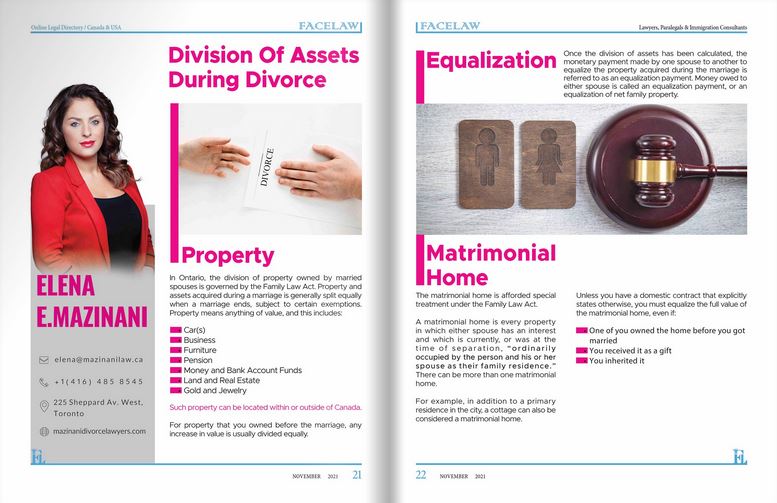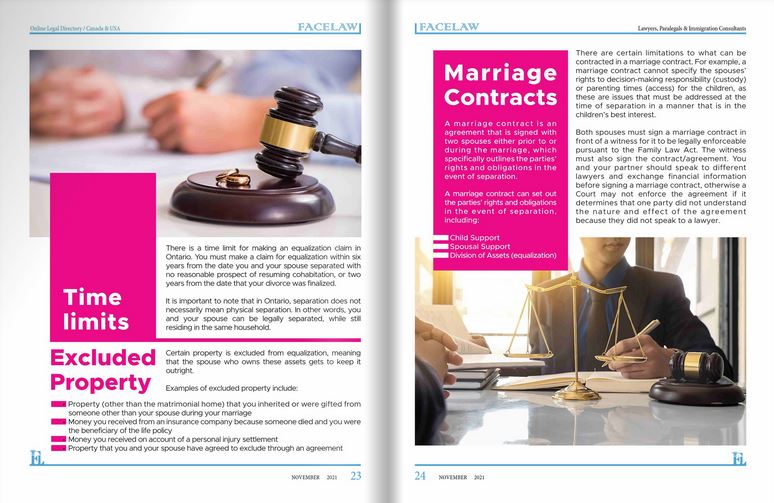Division Of Assets During divorce
Mazinani & Associates – Divorce Lawyers
DIVISION OF ASSETS DURING DIVORCE
Property
In Ontario, the division of property owned by married spouses is governed by the Family Law Act. Property and assets acquired during a marriage is generally split equally when a marriage ends, subject to certain exemptions. Property means anything of value, and this includes:
• Car(s)
• Business
• Furniture
• Pension
• Money and Bank Account Funds
• Land and Real Estate
• Gold and Jewelry
Such property can be located within or outside of Canada.
For property that you owned before the marriage, any increase in value is usually divided equally.
Equalization
Once the division of assets as been calculated, the monetary payment made by one spouse to another to equalize the property acquired during the marriage is referred to as an equalization payment. Money owed to either spouse is called an equalization payment, or an equalization of net family property.
Matrimonial Home
The matrimonial home is afforded special treatment under the Family Law Act.
A matrimonial home is every property in which either spouse has an interest and which is currently, or was at the time of separation, “ordinarily occupied by the person and his or her spouse as their family residence.” There can be more than one matrimonial home. For example, in addition to a primary residence in the city, a cottage can also be considered a matrimonial home.
Unless you have a domestic contract that explicitly states otherwise, you must equalize the full value of the matrimonial home, even if:
• one of you owned the home before you got married
• you received it as a gift
• you inherited it
Time limits
There is a time limit for making an equalization claim in Ontario. You must make a claim for equalization within six years from the date you and your spouse separated with no reasonable prospect of resuming cohabitation, or two years from the date that your divorce was finalized.
It is important to note that in Ontario, separation does not necessarily mean physical separation. In other words, you and your spouse can be legally separated, while still residing in the same household.
Excluded Property
Certain property is excluded from equalization, meaning that the spouse who owns these assets gets to keep it outright.
Examples of excluded property include:
• property (other than the matrimonial home) that you inherited or were gifted from someone other than your spouse during your marriage
• money you received from an insurance company because someone died and you were the beneficiary of the life policy
• money you received on account of a personal injury settlement
• property that you and your spouse have agreed to exclude through an agreement
Marriage Contracts
A marriage contract is an agreement that is signed with two spouses either prior to or during the marriage, which specifically outlines the parties’ rights and obligations in the event of separation.
A marriage contract can set out the parties’ rights and obligations in the event of separation, including:
• Child Support
• Spousal Support
• Division of Assets (equalization)
There are certain limitations to what can be contracted in a marriage contract. For example, a marriage contract cannot specify the spouses’ rights to decision-making responsibility (custody) or parenting times (access) for the children, as these are issues that must be addressed at the time of separation in a manner that is in the children’s best interest.
Both spouses must sign a marriage contract in front of a witness for it to be legally enforceable pursuant to the Family Law Act. The witness must also sign the contract/agreement. You and your partner should speak to different lawyers and exchange financial information before signing a marriage contract, otherwise a Court may not enforce the agreement if it determines that one party did not understand the nature and effect of the agreement because they did not speak to a lawyer.



